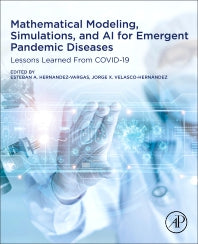Freshly Printed - allow 10 days lead
Couldn't load pickup availability
Mathematical Modeling, Simulations, and AI for Emergent Pandemic Diseases
Lessons Learned From COVID-19
Presents mathematical modeling and simulation techniques for pandemics based on the emerging data and understandings from COVID-19
Esteban A. Hernandez-Vargas (Edited by), Jorge X. Velasco-Hernandez (Edited by), Edgar N. Sanchez (Series edited by)
9780323950640, Elsevier Science
Paperback / softback, published 30 March 2023
348 pages
23.4 x 19 x 2.2 cm, 0.75 kg
Mathematical Modeling, Simulations, and Artificial Intelligence for Emergent Pandemic Diseases: Lessons Learned from COVID-19 includes new research, models and simulations developed during the COVID-19 pandemic into how mathematical methods and practice can impact future response. Chapters go beyond forecasting COVID-19, bringing different scale angles and mathematical techniques (e.g., ordinary differential and difference equations, agent-based models, artificial intelligence, and complex networks) which could have potential use in modeling other emergent pandemic diseases. A major part of the book focuses on preparing the scientific community for the next pandemic, particularly the application of mathematical modeling in ecology, economics and epidemiology. Readers will benefit from learning how to apply advanced mathematical modeling to a variety of topics of practical interest, including optimal allocations of masks and vaccines but also more theoretical problems such as the evolution of viral variants.
1. Modeling during an unprecedented pandemic 2. Global epidemiology and impact of the SARS-CoV-2 pandemic 3. Analysis of an ongoing epidemic: Advantages and limitations of COVID-19 modeling 4. On spatial heterogeneity of COVID-19 using shape analysis of pandemic curves 5. Pandemic response: Isolationism or solidarity? 6. Optimizing contact tracing: Leveraging contact network structure 7. Applications of deep learning in forecasting COVID-19 pandemic and county-level risk warning 8. COVID-19 population dynamics neural control from a complex network perspective 9. An agent-based model for COVID-19 and its interventions and impact in different social phenomena 10. Implementation of mitigation measures and modeling of in-hospital dynamics depending on the COVID-19 infection status 11. A mathematical model for the reopening of schools in Mexico 12. Mathematical assessment of the role of vaccination against COVID-19 in the United States 13. Ascertainment and biased testing rates in surveillance of emerging infectious diseases 14. Dynamical study of SARS-CoV-2 mathematical models under antiviral treatments 15. Statistical modeling to understand the COVID-19 pandemic 16. After COVID-19: Mathematical models, epidemic preparedness, and external factors in epidemic management
Subject Areas: Applied mathematics [PBW], Medical bioinformatics [MBF]


